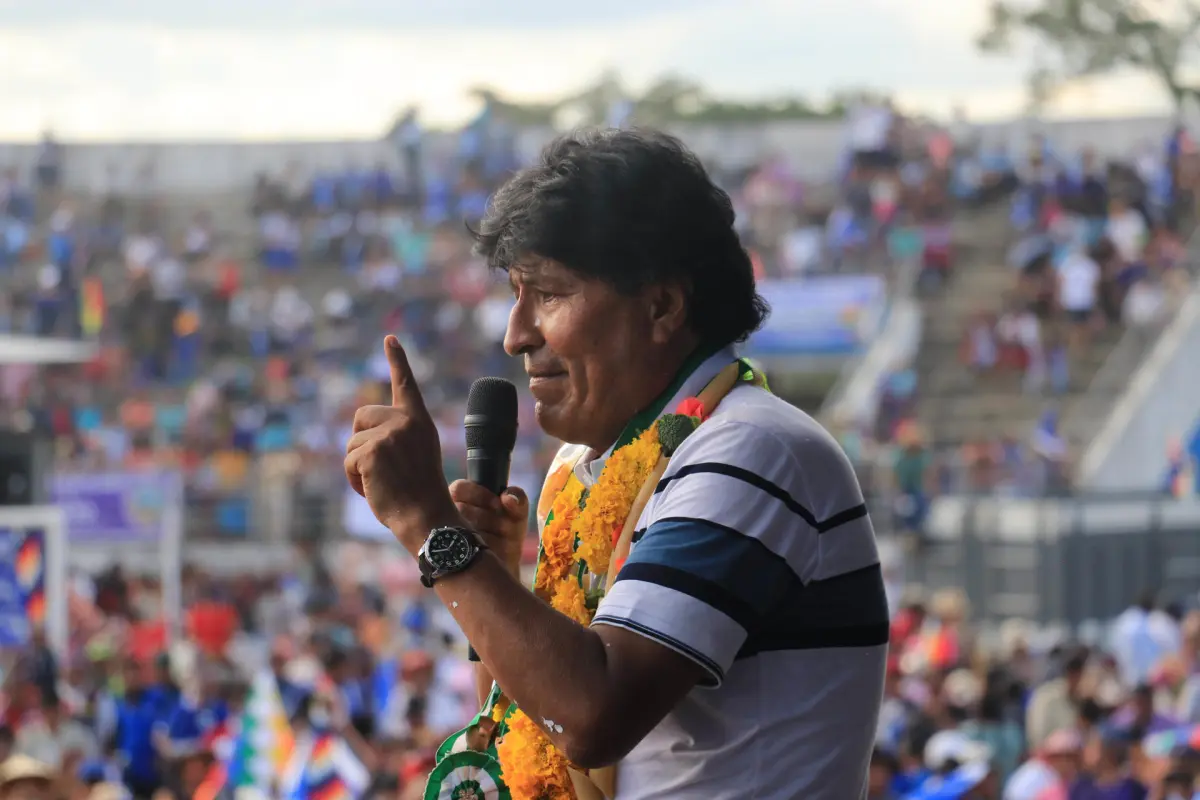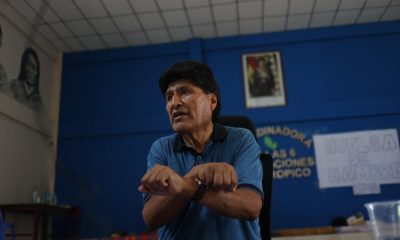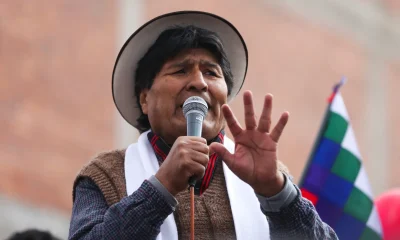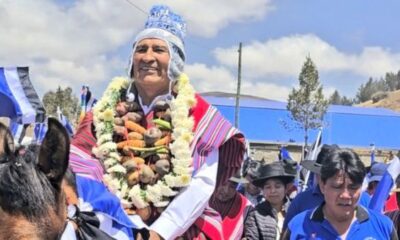International
Evo Morales celebrates the anniversary of the MAS and reiterates that he will be a presidential candidate in 2025

Former Bolivian president Evo Morales (2006-2019) led a massive celebration for the 29 years of the founding of the ruling Movement for Socialism (MAS) reaffirming that he is qualified to be a candidate in the 2025 presidential elections.
The event was the counterpoint to the rally organized on Thursday by the Government of President Luis Arce, which brought together a crowd of followers, under the slogan of commemorating a new anniversary of the creation of the MAS, with Morales absent.
The celebration of the groups related to Evo Morales or ‘evistas’, took place in the stadium of the town of Yapacaní, in the department of Santa Cruz, between typical dances and slogans of unity around who is also the leader of the MAS.
The attendees, most of them members of indigenous and peasant groups, exhibited hundreds of MAS flags, blue, black and white, also shouted that ‘Evo is not alone!’ constantly.
Ramiro Cucho, who is the main leader of the National Council of Ayllus and Markas del Qullasuyu (Conamaq) warned that they “want to disable” Morales as a candidate and also the MAS and that if that occurs there will be “an uprising” of the Bolivian people.
“If blood has to flow on the roads, we are going to do it (…) we will see each other in the streets,” the leader said vehemently.
On Wednesday, in an interview with EFE, Morales said that if he is disqualified for the 2025 elections, there will be “a convulsion” that will be the responsibility of the Government.
In the celebration of the MAS in Yapacaní, the followers insisted that they are the “true militancy” of that political party and reiterated that Morales is the “only candidate” of that organization.
Morales said that the Government and the opposition maintain that he is disabled from being a candidate “to demoralize, scare and make cry” the people, but that several “national and international experts” have said that: “Evo is qualified as a candidate.”
At the end of December, the Constitutional Court issued a resolution establishing that indefinite re-election is not a human right and that in Bolivia a continuous or discontinuous “only” is applied.
This affects the former governor who ruled Bolivia three times between 2006 and 2019 and who assures that the opinion of the Constitutional does not address his specific case and is only a consideration.
In his speech, Evo Morales spoke about planning the “program” for 2025 and raised proposals such as the delivery of a “second ease” for the elderly, state funding so that those who study can access postgraduate courses or install an electric vehicle assembly plant to reduce the public subsidy to fuels.
The former head of state also said that for this Tuesday an “emergency meeting” was called to analyze a recent resolution of the Supreme Electoral Tribunal (TSE) that urges the MAS to hold in “consensus” a new party congress at the end of 25 days.
The request of the electoral authority comes after the annulment of the MAS congress that in 2023 re-elected Morales as leader of that party and the recent call of the “archist” bloc, afin to the Government, which ignored that appointment and called a meeting in early May.
Morales and Arce, both from the MAS, have been distanced since the end of 2021, while the followers of each leader have raised them as possible candidates for the Presidency.
International
U.S. Senate Rejects Budget, Bringing Government Closer to Shutdown Amid DHS Dispute

The U.S. Senate voted on Thursday against a budget proposal in a move aimed at pressuring changes at the Department of Homeland Security (DHS), following the killing of two civilians during a deployment of immigration agents in Minneapolis.
All Senate Democrats and seven Republican lawmakers voted against the bill, which requires 60 votes to advance, pushing the country closer to a partial government shutdown that would cut funding for several agencies, including the Pentagon and the Department of Health.
The rejection came as Senate leaders and the White House continue negotiations on a separate funding package for DHS that would allow reforms to the agency. Proposed measures include banning Immigration and Customs Enforcement (ICE) agents from wearing face coverings and requiring them to use body-worn cameras during operations.
The vote took place just hours after President Donald Trump said he was “close” to reaching an agreement with Democrats and did not believe the federal government would face another shutdown, following last year’s record stoppage.
“I don’t think the Democrats want a shutdown either, so we’ll work in a bipartisan way to avoid it. Hopefully, there will be no government shutdown. We’re working on that right now,” Trump said during a Cabinet meeting at the White House.
International
Trump Says Putin Agreed to One-Week Halt in Attacks on Ukraine Amid Extreme Cold

U.S. President Donald Trump said on Thursday that he secured a commitment from Russian President Vladimir Putinto halt attacks against Ukraine for one week, citing extreme weather conditions affecting the region.
“Because of the extreme cold (…) I personally asked Putin not to attack Kyiv or other cities and towns for a week. And he agreed. He was very pleasant,” Trump said during a Cabinet meeting broadcast by the White House.
Trump acknowledged that several advisers had questioned the decision to make the call.
“A lot of people told me not to waste the call because they wouldn’t agree. And he accepted. And we’re very happy they did, because they don’t need missiles hitting their towns and cities,” the president said.
According to Trump, Ukrainian authorities reacted with surprise to the announcement but welcomed the possibility of a temporary ceasefire.
“It’s extraordinarily cold, record cold (…) They say they’ve never experienced cold like this,” he added.
Ukrainian President Volodymyr Zelensky later commented on the announcement, expressing hope that the agreement would be honored.
International
Storm Kristin Kills Five in Portugal, Leaves Nearly 500,000 Without Power

Storm Kristin, which battered Portugal with heavy rain and strong winds early Wednesday, has left at least five people dead, while nearly half a million residents remained without electricity as of Thursday, according to updated figures from authorities.
The revised death toll was confirmed to AFP by a spokesperson for the National Emergency and Civil Protection Authority (ANPEC). On Wednesday, the agency had reported four fatalities.
Meanwhile, E-Redes, the country’s electricity distribution network operator, said that around 450,000 customers were still without power, particularly in central Portugal.
Emergency services responded to approximately 1,500 incidents between midnight and 8:00 a.m. local time on Wednesday, as the storm caused widespread disruptions.
The Portuguese government described Kristin as an “extreme weather event” that inflicted significant damage across several regions of the country. At the height of the storm, as many as 850,000 households and institutions lost electricity during the early hours of Wednesday.
Several municipalities ordered the closure of schools, many of which remained shut on Thursday due to ongoing adverse conditions.
Ricardo Costa, regional deputy commander of the Leiria Fire Brigade, said residents continue to seek assistance as rainfall persists.
“Even though the rain is not extremely intense, it is causing extensive damage to homes,” he noted.
In Figueira da Foz, a coastal city in central Portugal, strong winds toppled a giant Ferris wheel, underscoring the severity of the storm.
-

 International5 days ago
International5 days agoU.S. Senate Rejects Budget, Bringing Government Closer to Shutdown Amid DHS Dispute
-

 Central America4 days ago
Central America4 days agoPanama Supreme Court Strikes Down Panama Ports Concession as Unconstitutional
-

 Central America4 days ago
Central America4 days agoU.S. and Guatemala Sign Trade Deal Granting Zero Tariffs to Most Exports
-

 International5 days ago
International5 days agoStorm Kristin Kills Five in Portugal, Leaves Nearly 500,000 Without Power
-

 International5 days ago
International5 days agoMan Arrested After Vehicle Crashes Into Jewish Institution in Brooklyn
-

 International5 days ago
International5 days agoTrump Says Putin Agreed to One-Week Halt in Attacks on Ukraine Amid Extreme Cold
-

 Central America2 days ago
Central America2 days agoCosta Rica Goes to the Polls as Voters Choose Continuity or Change
































